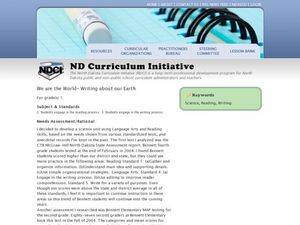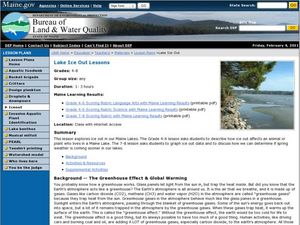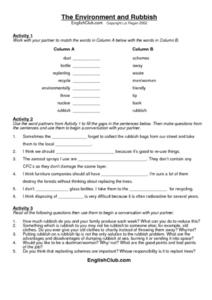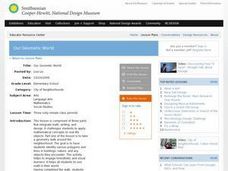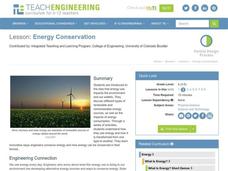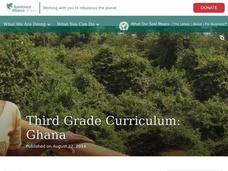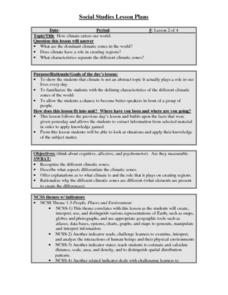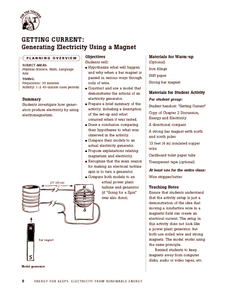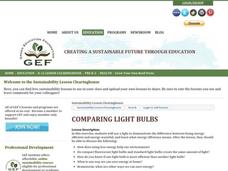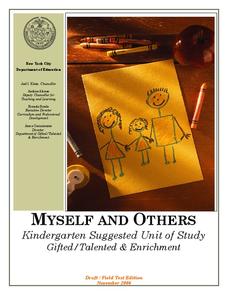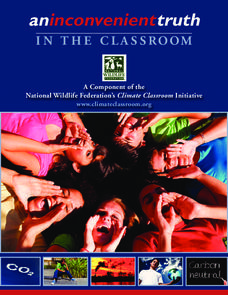Curated OER
Nutrition Lesson Plans That Promote Healthy Habits
Students can learn about good nutrition, and the environment through these inspiring health lesson plans
Curated OER
We are the World - Writing about our Earth
First graders write facts about the Earth. In this Earth lesson, 1st graders discuss natural resources, recycling, and how to keep the Earth clean. They work in groups to create a small book with 3-5 facts about the Earth's environment.
Curated OER
Lake Ice Out Lessons
Students explore the greenhouse effect. In this environment instructional activity, students describe how "ice out" affects animals and plants who live in a Maine lake. Students graph "ice out" data and make predictions about...
Curated OER
The Environment and Rubbish
Students complete matching, short answer, and fill-in-the-blank questions regarding garbage and the environment. Some thought-provoking conversation starters are embedded in the plan which should lead to some meaningful discussion...
Curated OER
Our Space Station Earth
Students discover ways to preserve the Earth's resources. In this natural resources lesson, students investigate how many gallons of water the average American uses per day and then total their estimated usage. Students discuss the...
Curated OER
Toxic River
Learners explore environmental safety by participating in a class game. In this toxic chemicals lesson, students discuss the effect chemicals have on our environment and how to best protect against their dangers. Learners participate in...
Curated OER
Modeling Our Writing Style After Another Author's Style
Students reread "The Senegalese Miracle" from a previous lesson. As they read, they must underline as many images related to their senses as possible and share their findings with the class. In partners, they practice chunking...
Curated OER
Shade Temperatures, Sun Temperatures
A simple activity prompts learners to take temperature readings in the shade and in the sun. This would be a good supplement to any study of how trees keep our environment cooler.
Curated OER
Where Does Our Food Come From?
Fourth graders identify the state or country that a food product came from and locate it on a map. They identify products that are grown in Hawaii and the factors important in the location of economic activities.
Curated OER
Our Geometic World
Students walk around the neighborhood and identify various polygons and lines in buildings, nature and other objects. They design a building using various geometric patterns, shapes and lines. Students complete a descriptive writing of...
WindWise Education
Are Birds Impacted by Small Wind Turbines?
How do we know if the wind turbine at our school is impacting birds? Here, small groups work together and conduct field work in order to determine the impact of a human-made structure on birds. The groups also determine their searcher...
Curated OER
Where is Away?
Focusing on where are garbage goes once we dispose of it, learners explore environmental concerns. Using a clear format, this lesson leads learners through a discussion of waste reduction, recycling, and composting. Then, they discuss...
Curated OER
Energy Conservation
Students investigate energy conservation. In this energy conservation and analyzing data lesson, students identify and explain several energy sources and research renewable and nonrenewable energy sources. Students use statistics...
Curated OER
Surviving in Our Ecosystems
Third graders investigate the balance of ecosystems and how each species has different survival needs. They research on the internet using the site included. They then participate in activities/centers utilizing the facts they discovered.
Curated OER
Pollution
Young ecologists investigate some of the many ways that human activities adversely affect the environment. After identifying the main types of pollution (air, water, soil), 3rd graders fill in a Venn Diagram by pasting cut-out pictures...
California Academy of Science
Coincidental Colonization
The Galápagos Islands are an amazing place of isolated adaptation, colonized by an interesting mix of plants and animals. The class plays a game to help them understand how these organisms came to live on the island through a combination...
Florida International University
The Good, the Bad and the Nasty Tasting
Examine the benefits of chemical defense mechanisms. Organisms in oceans use chemicals to ward off predators. Duplicate this adaptation using a hands-on experiment in which you ward off your predators (your pupils) with some...
Curated OER
How climate enters our world
Learners recognize the different climatic zones. They describe what aspects differentiate the climatic zones. Students offer explanations as to what climate is and the role that it plays on creating regions. They rationalize why the...
Teach Engineering
What Makes Our Bones Strong?
So is that what you meant by rubber legs? The activity has pairs subject a chicken bone to vinegar and observe what happens over a period of days. Individuals then write up a lab report and document their observations and findings.
Energy for Keeps
Getting Current: Generating Electricity Using a Magnet
Give your class a magnetic charge with this creative experiment designed to teach emerging scientists about electromagnetism. Pupils construct a model that demonstrates the function of an electrical generator and test this creation in a...
Curated OER
Comparing Light Bulbs
Third graders learn how light bulbs are different and which are more cost efficient. In this energy and efficiency lesson, 3rd graders compare the cost of a light bulb and understand that its lifetime is important to their...
New York City Department of Education
Myself and Others
Self reflection is an important skill to reinforce in our children, and it's especially helpful to help them realize who they are in the context of their environment. A collection of lessons about self image and community encourage...
It's About Time
Effects of Plate Tectonics
Explore our world from within as you lead young scientists on a thrilling adventure. Pupils examine the location of plate boundaries to determine earthquake and volcano distribution around the globe and explore the cause of hot spots in...
National Wildlife Federation
An Inconvenient Truth in the Classroom
Global warming — what a hot topic! A thorough unit challenges learners to research, read, explore, and write about carbon, its role and increasing nature in our atmosphere, and how global warming is affecting lives and environments...

